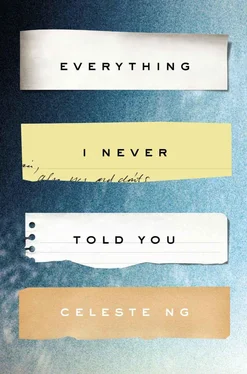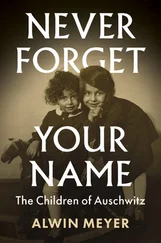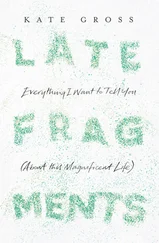Of course it was possible for her: she had no husband. She let her son run wild. Without a husband, without children, perhaps it would have been possible. I could have done that, Marilyn thought, and the words clicked into place like puzzle pieces, shocking her with their rightness. The hypothetical past perfect, the tense of missed chances. Tears dripped down her chin. No, she thought suddenly. I could do that.
And then, to her embarrassment and horror, there was Janet Wolff before her, bending solicitously in front of her chair.
“Marilyn?” she said. “It’s Marilyn, right? Mrs. Lee?”
To which Marilyn replied the only words in her mind: “Dr. Wolff.”
“What’s wrong?” Dr. Wolff asked. “Are you ill?” Up close, her face was surprisingly young. Beneath her powder, a faint constellation of freckles still dotted her nose. Her hand, gentle on Marilyn’s shoulder, was steady and assured, and so was her smile. Everything will be fine, it seemed to say.
Marilyn shook her head. “No, no. Everything’s fine.” She looked up at Janet Wolff. “Thank you.” And she meant it.
The next evening, after a dinner of canned ravioli and canned vegetable soup, she planned it out in her mind. She had all of her mother’s savings, enough for a few months; when her mother’s house was sold, she would have more, enough for a few years, at least. In a year, she could finish her degree. It would prove that she still could. That it was not too late. After that, at last, she would apply to medical school. Only eight years later than planned.
While the children were at school, she drove an hour to the community college outside Toledo and enrolled in organic chemistry, advanced statistics, anatomy: everything she’d planned for her last semesters. The next day, she made the drive again and found a furnished efficiency near the campus, signing a lease for the first of May. Two weeks away. Every night, when she was alone, she read the cookbook again, steeling herself with her mother’s small and lonely life. You don’t want this, she reminded herself. There will be more to your life than this. Lydia and Nath would be fine, she told herself again and again. She would not let herself think otherwise. James would be there. Look how they had managed while she was in Virginia. It was still possible.
In the quiet dark, she packed her old college textbooks into cartons and tucked them in the attic, ready to go. As May approached, she cooked lavish meal after lavish meal: Swedish meatballs, beef Stroganoff, chicken à la king — everything James and the children liked best, everything from scratch, just as her mother had taught her. She baked a pink birthday cake for Lydia and let her eat as much as she wanted. On the first of May, after Sunday dinner, she sealed leftovers in Tupperware and put them in the freezer; she baked batch after batch of cookies. “It’s like you’re preparing for a famine,” James said, laughing, and Marilyn smiled back, a fake smile, the same one she had given to her mother all those years. You lifted the corners of your mouth toward your ears. You kept your lips closed. It was amazing how no one could tell.
That night, in bed, she wrapped her arms around James, kissed the side of his neck, undressed him slowly, as she had when they were younger. She tried to memorize the curve of his back and the hollow at the base of his spine, as if he were a landscape she would never see again, beginning to cry — silently at first and then, as their bodies collided again and again, more fiercely.
“What is it?” James whispered, stroking her cheek. “What’s wrong?” Marilyn shook her head, and he pulled her close, their bodies sticky and damp. “It’s okay,” he said, kissing her forehead. “Everything will be better tomorrow.”
In the morning, Marilyn burrowed beneath the covers, listening to James dress. The zip as he fastened his trousers. The clink as he buckled his belt. Even with her eyes closed, she could see him straightening his collar, smoothing the cowlick in his hair, which still, after all these years, made him look a bit like a schoolboy. She kept them closed when he came to kiss her good-bye, because if she saw him, she knew the tears would come again.
At the bus stop, later that morning, she knelt on the sidewalk and kissed Nath and Lydia each on the cheek, not daring to look into their eyes. “Be good,” she told them. “Behave. I love you.”
After the bus had disappeared around the curve of the lake, she visited her daughter’s room, then her son’s. From Lydia’s dresser she took a single barrette, cherry-colored Bakelite with a white flower, one of a pair she seldom wore. From the cigar box beneath Nath’s bed she took a marble, not his favorite — the cobalt with white specks like stars — but one of the little dark ones, the ones he called oilies. From the inside of James’s overcoat, the old one he’d worn in her college days, she snipped the spare button from the underside of the lapel. A tiny token from each, tucked into the pocket of her dress — a gesture that would resurface in her youngest child years later, though Marilyn would never mention this small theft to Hannah, or to anyone. Not something treasured and loved; something they might miss but would not grieve. No need to tear another hole, even a pinprick, in their lives. Then Marilyn took her boxes from their hiding place in the attic and sat down to write James a note. But how did you write something like this? It seemed wrong to write to him on her stationery, as if he were a stranger; more wrong still to write it on the scratch pad in the kitchen, as if it were no more important than a grocery list. At last she pulled a blank sheet from the typewriter and sat down at her vanity with a pen.
I realize that I am not happy with the life I lead. I always had one kind of life in mind and things have turned out very differently. Marilyn took a deep, ragged breath. I have kept all these feelings inside me for a long time, but now, after being in my mother’s house again, I think of her and realize I cannot put them aside any longer. I know you’ll be fine without me. She paused, trying to convince herself this was true.
I hope you can understand why I have to leave. I hope you can forgive me.
For a long time Marilyn sat, ballpoint in hand, unsure how to finish. In the end she tore up the note and tossed the shreds into the wastepaper basket. Better, she decided, just to go. To disappear from their lives as if she had never been there.
To Nath and Lydia, who that afternoon found themselves unmet at the bus stop, who let themselves into an unlocked and empty house, that was exactly how it seemed. Their father, when he came home two hours later to find his children huddled on the front steps, as if they were afraid to be in the house alone, kept asking questions. “What do you mean, gone ?” he asked Nath, who could only repeat: gone, the only word he could find.
Lydia, meanwhile, said nothing at all during the confused rest of the evening, in which their father called the police and then all the neighbors but forgot about dinner, and bedtime, as the policemen took note after note until she and Nath fell asleep on the living room floor. She awoke in the middle of the night in her own bed — where her father had deposited her, shoes still on — and felt for the diary her mother had given her at Christmas. At last something important had occurred, something that she ought to write down. But she did not know how to explain what had happened, how everything had changed in just one day, how someone she loved so dearly could be there one minute, and the next minute: gone.
Hannah knows nothing about that summer, of her mother’s long-ago disappearance. For as long as she’s been alive, the family has never spoken of it, and even if they had, it would have changed nothing. She is furious with her sister for vanishing, bewildered that Lydia would leave them all behind; knowing would only have made her more furious, more bewildered. How could you, she would have thought, when you knew what it was like? As it is, imagining her sister sinking into the lake, all she can think now is: How? And: What was it like?
Читать дальше












